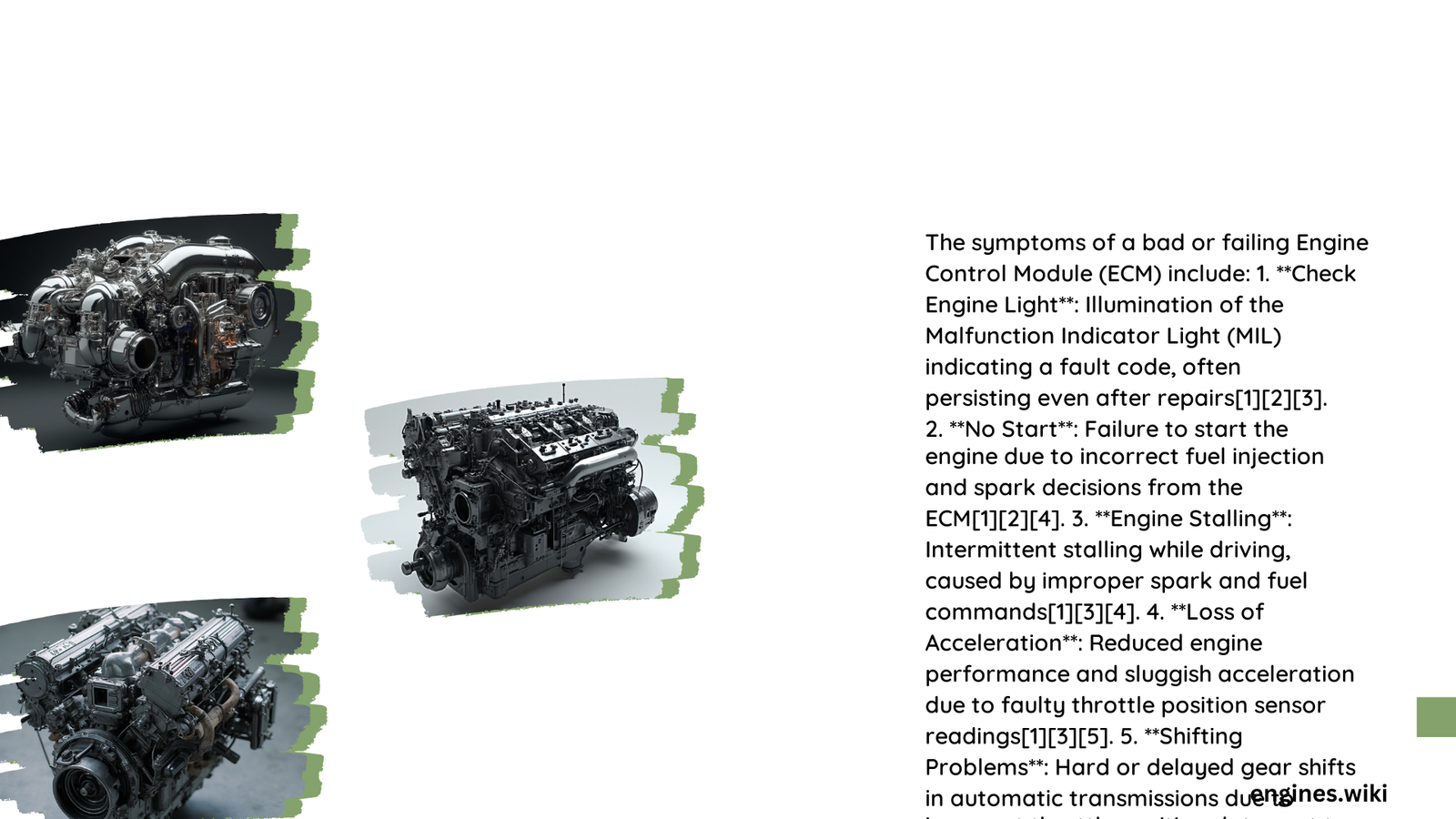The Engine Control Module (ECM) is a critical component in modern vehicles, responsible for managing various engine functions. When an ECM fails, it can lead to a range of symptoms affecting vehicle performance, fuel efficiency, and overall drivability. Common engine control module symptoms include engine misfires, stalling, decreased fuel efficiency, illuminated warning lights, and error codes. Recognizing these symptoms early can help prevent more severe engine damage and costly repairs.
What Are the Key Performance Indicators of ECM Failure?
Engine Control Module (ECM) failure can manifest in various ways, affecting your vehicle’s performance and efficiency. Here are some key indicators:
- Engine Misfires and Stalling: A faulty ECM may cause incorrect fuel-to-air ratios or improper ignition timing, leading to:
- Frequent engine misfires
- Unexpected stalling, especially at idle
-
Rough running or hesitation during acceleration
-
Decreased Fuel Efficiency: When the ECM fails to optimize fuel consumption, you may notice:
- A significant drop in miles per gallon (MPG)
- More frequent refueling
-
Increased fuel costs
-
Poor Engine Performance: ECM issues can result in:
- Sluggish acceleration
- Reduced power output
-
Inconsistent engine behavior
-
Starting Problems: A malfunctioning ECM might cause:
- Difficulty starting the engine, especially in cold weather
- Extended cranking time before the engine turns over
- Intermittent no-start conditions
How Does the Check Engine Light Relate to ECM Issues?

The check engine light, also known as the Malfunction Indicator Lamp (MIL), is often the first sign of ECM problems:
- Illumination Patterns:
- Steady light: Indicates a persistent issue
-
Flashing light: Signals a more severe problem requiring immediate attention
-
Associated Warning Lights: Along with the check engine light, you may see:
- Traction control light
- ABS warning light
-
Battery or charging system light
-
Diagnostic Trouble Codes (DTCs):
- ECM-related codes often start with P06xx
- Common codes include P0600, P0601, P0602, P0603, P0604, and P0605
What Diagnostic Tests Can Identify ECM Problems?
To accurately diagnose ECM issues, mechanics use various diagnostic tools and techniques:
- OBD-II Scanner: This tool can:
- Read and interpret error codes
- Monitor real-time data from engine sensors
-
Identify specific ECM malfunctions
-
Voltage Testing:
- Checks power supply to the ECM
- Verifies proper grounding
-
Identifies potential short circuits or corrosion issues
-
Performance Testing:
- Monitors engine parameters during operation
- Assesses fuel trim levels and ignition timing
- Evaluates sensor inputs and ECM outputs
How Do ECM Issues Affect Cold Starts vs. Warm Starts?
ECM problems can manifest differently depending on engine temperature:
Cold Starts:
- Difficulty starting the engine
- Extended cranking time
- Rough idling immediately after start-up
Warm Starts:
- Intermittent stalling
- Hesitation or stumbling during acceleration
- More frequent misfires
What Are the Costs Associated with ECM Diagnosis and Repair?
Understanding the potential costs can help you prepare for ECM-related repairs:
- Diagnostic Fees:
- Average cost: $75 to $150
-
Time required: 1 to 3 hours
-
ECM Replacement:
- Parts cost: $500 to $1,000
- Labor cost: $300 to $500
-
Total replacement cost: $800 to $1,500
-
ECM Reprogramming:
- Cost: $150 to $300
-
Often less expensive than full replacement
-
Time Frame for Repairs:
- Diagnosis: 1 to 3 hours
- Replacement or reprogramming: 2 to 5 hours
How Can You Prevent ECM Failures?
While some ECM issues are unavoidable, you can take steps to minimize the risk:
- Regular Maintenance:
- Follow manufacturer-recommended service schedules
-
Keep electrical systems in good condition
-
Protect from Environmental Factors:
- Avoid exposure to extreme temperatures
-
Protect the ECM from moisture and corrosion
-
Use Quality Parts:
- Install OEM or high-quality aftermarket components
-
Avoid cheap, unreliable electrical parts
-
Address Warning Signs Promptly:
- Don’t ignore check engine lights
- Investigate unusual engine behavior immediately
By understanding engine control module symptoms and taking proactive measures, you can help ensure your vehicle’s ECM functions properly, maintaining optimal performance and efficiency.
